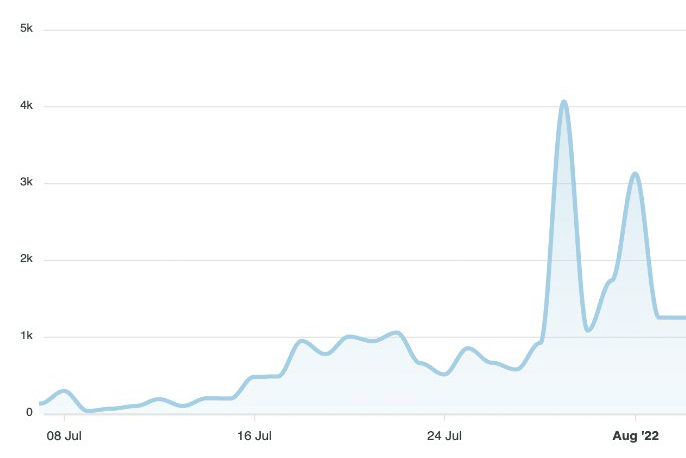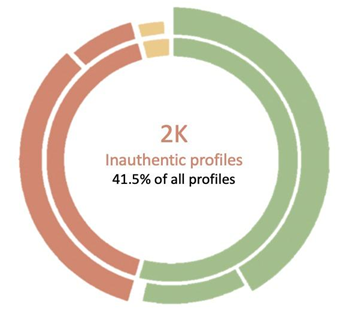The small Baltic country of Latvia is heading for elections.
Again.
The election for the Saeima, the Latvian parliament, is set for 1 October 2022. Since Latvia declared independence from USSR in 1991, The small country (1.9 million people) has seen elections much more frequently than its parliament cycle of four years. Nine parliamentary elections and over twenty governments were elected in Latvia in the last 31 years, leading to a rapidly diminishing voter turnout: 54.6% in 2018 in comparison to 91.2% in 1993.
But social media tells a different story. One in which apathy and indifference are absent, and voters are not only well informed of every detail on the election’s agenda, but also have strong, clear, and conflicting opinions. How many of those voters are real, though, and how many are fake profiles?
Cyabra set on a quest to find out.
War is Always on Topic
Any politician will tell you that elections are not just about who’s best to lead the country: They’re about which party can catch and understand a need, fear, problem or wish of voters, and run a campaign that directly addresses those topics. President Franklin D. Roosevelt ran a campaign supporting US neutrality in WW2, but a few years later, was elected again for his willingness to enter the very same war.
The hot topic of the Latvian election is, unsurprisingly, the Ukraine-Russia war. Many European countries were directly affected by the war, including Latvia, which shares a border with Russia. While Latvian is the country’s official language, Russian-speaking Latvians make 37% of the country’s population. Most of them are ethnic Russians, but there are other minorities, such as Ukrainians, Belarusians and Jews.
The Russian-speaking minority appears to be not only a main focus of the coming election, but also the center of many of those social debates. The discourse around Latvia’s election and Latvian politics in general increased in the past months on all social networks, and especially on Facebook, which remains one of the most popular platforms in Latvia.

Cyabra identified a clear division between profiles supporting Prime Minister Krišjānis Kariņš and the associated party New Unity, which were promoting anti-Russian narratives, and profiles supporting rival politician Aleksejs Rosļikovs and his associated party Stability, promoting pro-Russian narratives.
But how much of this passionate debate was led by authentic profiles?
Fake Profiles All Across the Map
During a period of 30 days (mid-July to mid-August), Cyabra’s scanned nearly 25,000 accounts interacting with or mentioning the Latvian parties and their candidates on Facebook, Twitter and VKontakte (VK). We found a total of 20% (5,487) of them to be inauthentic. In contrast, the average number of inauthentic profiles engaging in pre-election activity in western countries can average between 5%-15%.
It gets worse. A scan of the profiles supporting PM Krišjānis Kariņš identified 41.5% (!) of them (2,216 out of 5,334) as inauthentic. That number is much higher than the average number of fake profiles scanned in similar circumstances. Those fake profiles mostly used Latvian and English when participating in conversations, and used hashtags such as #RussiaTerroristState, #ArmUkraineNow and #StopRussiaNow.

A lower (but still significant) number of inauthentic profiles interacted with Aleksejs Rosļikovs: 25% of interacting profiles were tagged as inauthentic (1,700 of 6,800 total profiles). Here, most of the inauthentic profiles conversed in the Russian language.

Cyabra also analyzed 13,000 mentions or interactions regarding the Russian-Latvian parties and their candidates, and uncovered several networks of inauthentic profiles, primarily on Facebook, both promoting and deprecating candidates or parties. 28% of this discourse was flagged as inauthentic.

Inauthentic profiles were also attacking a third party, Latvia First, using the Latvian language. Interestingly, those inauthentic profiles were not the same inauthentic profiles that promoted Stability or New Unity, and stayed clear of topics and hashtags related to those parties. In contrast, authentic profiles usually have no problem mentioning multiple competing parties while attacking one and promoting the other – the parties Harmony and Latvian Russian Union, for example, were commonly mentioned in the same post by authentic profiles.
The Slippery Slope of Fake Discourse
Russian-speaking Latvians have lately reported that they are commonly harassed, looked upon with suspicion and hostility, and questioned about their loyalty and patriotism. While approaching elections always tends to stir up division and discord, as a rule, inauthentic profiles would always show more hostility and resentment than authentic profiles, which can turn an already existing conflict into a snowball of hatred.
While navigating through political discussions on social media, Cyabra advises double-checking a post before sharing and even before engaging in a conflicting conversation. Help us keep social media safer and more authentic.
Election Meddling or Brand Reputation – We’ve Got You Covered.
Cyabra measures impact and authenticity in social networks. We offer global brands, corporations, and government agencies the ability to understand narratives, discover trends, and reach real audiences. Our AI software can monitor online conversations and determine where content is coming from, ultimately allowing your company to plan ahead based on real-time trends, and terminate disinformation problems before they grow out of hand.
Read more:
Russian-speakers in Latvia told to pick sides in test of patriotism:
https://www.bbc.com/news/world-europe-62592714
Russian-speaking Latvian: Russians sick with putinisis shame my native language
Rough Translation, NPR: The complicated role of Russian speakers in wartime


